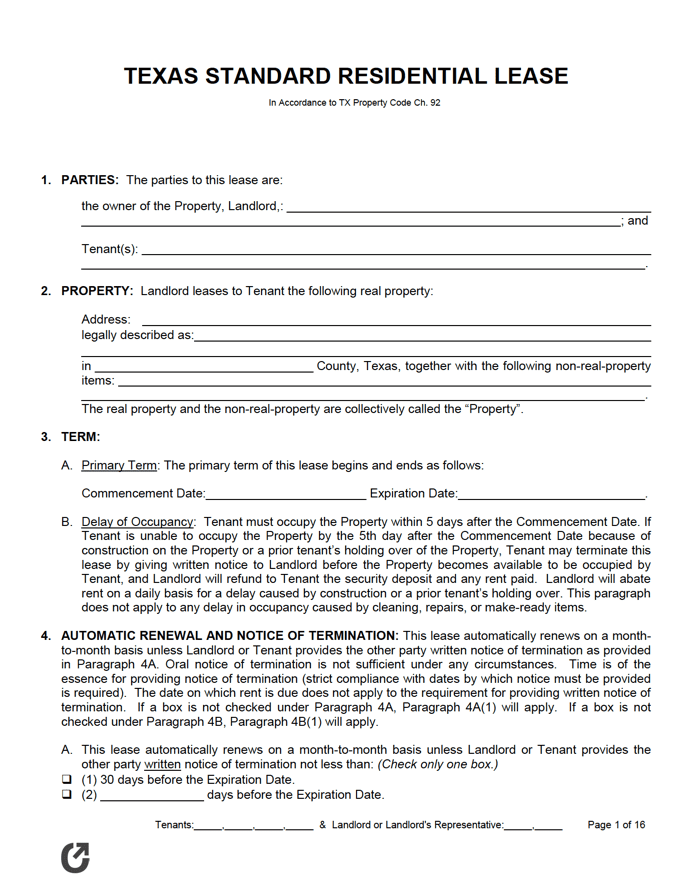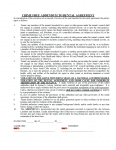Texas Rental Lease Agreement Templates (6)
A Texas rental lease agreement is a form used for renting out a livable space to a tenant in exchange for regular payments. The forms lay the ground rules for what a tenant can and cannot due and it establishes consequences for rent that goes unpaid, damage that occurs in the unit, and other tenant-caused acts.
Landlords will often make use of a lease application to verify the prospective tenant has adequate credit, criminal, and rental history.
Types (6)
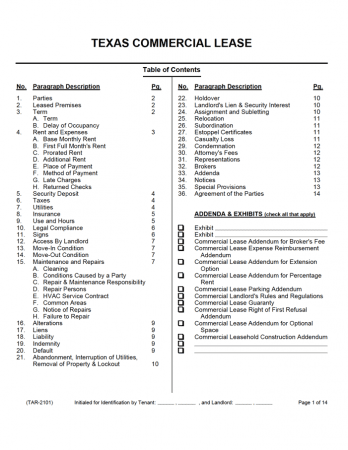 Commercial Lease Agreement – Used for renting out property that is zoned specifically for business use. Complies with all TX laws and regulations.
Commercial Lease Agreement – Used for renting out property that is zoned specifically for business use. Complies with all TX laws and regulations.
Download – PDF
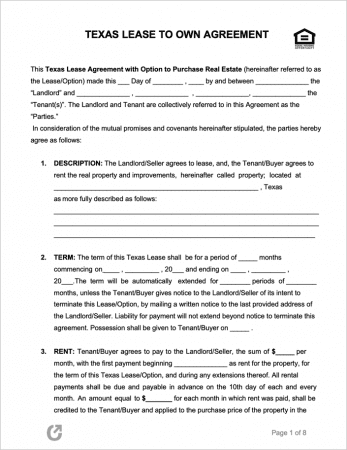 Lease to Own Agreement – Gives tenants the option of purchasing the rental at the end of the lease.
Lease to Own Agreement – Gives tenants the option of purchasing the rental at the end of the lease.
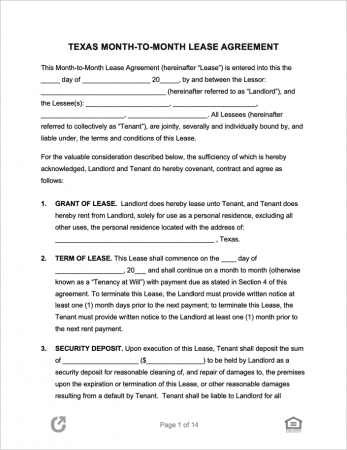 Month-to-Month Lease Agreement – For renting out a property one (1) month at a time. No set end date.
Month-to-Month Lease Agreement – For renting out a property one (1) month at a time. No set end date.
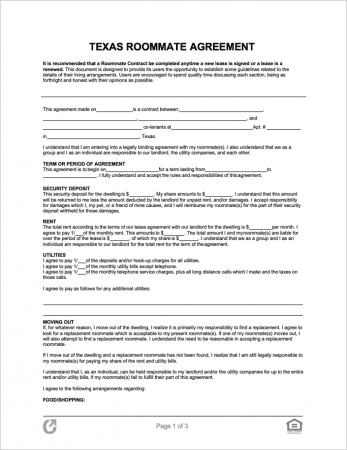 Roommate Agreement – For establishing rules and routines for a rental shared by two (2) or more co-tenants.
Roommate Agreement – For establishing rules and routines for a rental shared by two (2) or more co-tenants.
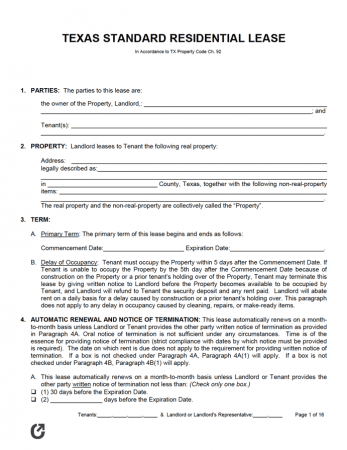 Standard Residential Lease Agreement – The most common rental contract. For renting out a property for a fixed-term, such as one (1) year.
Standard Residential Lease Agreement – The most common rental contract. For renting out a property for a fixed-term, such as one (1) year.
Download – PDF
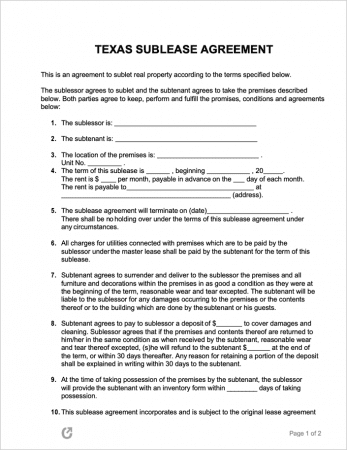 Sublease Agreement – Used for having another person “take over” one’s lease. This allows the original tenant to move out without having to pay rent for two (2) places.
Sublease Agreement – Used for having another person “take over” one’s lease. This allows the original tenant to move out without having to pay rent for two (2) places.
Addendums (5)
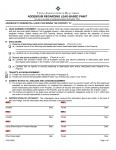 Addendum 1 – TAR-2008 (Lead Paint)
Addendum 1 – TAR-2008 (Lead Paint)
Download: Adobe PDF
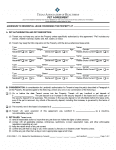 Addendum 2 – TAR-2004 (Pet Agreement)
Addendum 2 – TAR-2004 (Pet Agreement)
Download: Adobe PDF
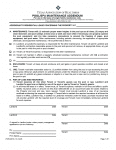 Addendum 3 – TAR 2010 (Pool/Spa Maintenance)
Addendum 3 – TAR 2010 (Pool/Spa Maintenance)
Download: Adobe PDF
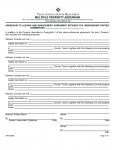 Addendum 4 – 2204 (Multiple Properties)
Addendum 4 – 2204 (Multiple Properties)
Download: Adobe PDF
Download: Adobe PDF
Amendments (2)
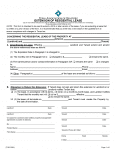 Amendment 1 – TAR-2005 (Lease Extension)
Amendment 1 – TAR-2005 (Lease Extension)
Download: Adobe PDF
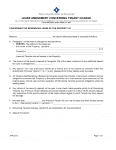 Amendment 2 – TAR-2211 (Tenant Change)
Amendment 2 – TAR-2211 (Tenant Change)
Download: Adobe PDF
State Laws & Guides
Laws
- Ch. 91. “Provisions Generally Applicable to Landlords and Tenants”
- Ch. 92. “Residential Tenancies”
- Ch. 93. “Commercial Tenancies”
- Ch. 301 “Texas Fair Housing Act”
Landlord-Tenant Guides / Handbooks
When is Rent Due?
The precise due date of rent is not stated by TX law. As such, the due date of rent should be clearly outlined in the written lease agreement. According to § 92.019, a landlord must provide a tenant with a grace period of one (1) day. Meaning a landlord can only charge a late fee after the rent has gone unpaid for a minimum of one (1) day.
Landlord’s Access
Emergency: No statute. However, federal law provides landlords with the right of entry to an occupied rental property (without notice) in the event of an emergency.
Non-Emergency: No statute. State law does not specify a mandatory notice period for a landlord to access the rental property in non-emergency situations. However, to be courteous, landlords are recommended to provide tenants with at least twenty-four (24) hours notice prior to making entry.
Required Disclosures
- Lead Paint Disclosure: If a landlord to a property constructed before 1978 is aware of any lead paint hazards in the rental, they must inform the tenants of such hazards prior to their move-in date. Additionally, the landlord must provide the tenant(s) with a copy of a brochure about lead-based hazards in the home.
- Names and Addresses (§ 92.201(a)): A landlord must disclose to the tenant(s) “the name and either a street or post office box address of the holder of record title, according to the deed records in the county clerk’s office, of the dwelling rented by the tenant or inquired about by the government official or employee acting in an official capacity.” If a management company is primarily responsible for managing the dwelling, the name and address of this company should be given instead.
- Parking Rules (§ 92.013(a)): Landlords that manage multiunit complexes must provide tenants with a copy of any relevant towing and/or parking rules/policies, and inform them of any changes to the towing rules/policies.
- Rule or Policy Changes (§ 92.013(a)): If the landlord wishes to change a rule or policy that is not included in the lease agreement and will affect any personal property owned by the tenant that is located outside the tenant’s dwelling, they are required to provide the tenant prior written notice.
- Special Conditions to Cancel Agreement (§ 92.016): A landlord must include a statement in the lease agreement that is similar (or identical) to the following: “Tenants may have special statutory rights to terminate the lease early in certain situations involving family violence or a military deployment or transfer.”
- Tenant’s Remedies (§ 92.056(g)): A landlord must ensure the written lease contains language, in underlined or bold text, that informs the tenant of the remedies available to them under sections 92.056 and 92.0561.
Security Deposits
Maximum: No statute; landlords can request tenants pay whatever security deposit they deem as fair. The recommended deposit is one (1) months’ rent for unfurnished units and two (2) months’ rent for fully furnished units. Requiring an additional deposit from tenants with pets is also recommended.
Returning to Tenant (§ 92.103): The landlord must return a security deposit to the tenant on or before the thirtieth (30th) day after the date the tenant moves-out of the dwelling.
Deposit Interest: No statute.
